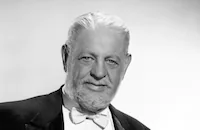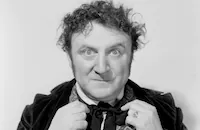The King Steps Out

Brief Synopsis
Cast & Crew
Josef Von Sternberg
Miss Grace Moore
Franchot Tone
Walter Connolly
Raymond Walburn
Elisabeth Risdon
Film Details
Technical Specs

Synopsis
Maximilian, Duke of Bavaria, and the Emperor Franz Josef of Austria's uncle, has six daughters, including Helena and Elizabeth, in a household run by his wife Sofia. Sofia has planned for Helena to marry the emperor, not the man she loves, the officer Palfi. Despite Elizabeth's attempted intercession on Helena's behalf, their father remains too intimidated to defy his wife, who leaves with Helena for Austria. Elizabeth manages to convince her father to join her in a plan to invade the palace and retrieve Helena, and the father and daughter arrive together in Hellbrun and check into the Golden Ox Inn. Elizabeth gains access to the palace and attracts the eye of Franz Josef, who has yet to meet Helena. Elizabeth hides when Maximilian ineffectually visits his nephew, and her father conceals himself rather than face Sofia and his sister the empress, who has commanded her son's proposed marriage. That evening at the inn, Franz Josef calls on Elizabeth, who has only identified herself as a dressmaker, to attend incognito the birthday fair given in his honor. To his mother's consternation, Franz Josef fails to return to the palace until the next morning. Elizabeth, now in love with Franz Josef, tells Helena she can safely end the royal engagement, but her sister merely believes that Elizabeth is jealous. The empress has Elizabeth jailed, but Franz Josef rescues her after a conversation with Palfi. Maximilian finally stands up to the empress and rejects the arranged marriage, then tells Franz Josef Elizabeth's true identity. She had kept her royal blood a secret from him because he proclaimed himself unenthusiastic over marrying nobility--when it concerned Helena. Now the couple appear together on the balcony of the Golden Ox, to the cheers of a crowd.

Director

Josef Von Sternberg
Cast
Miss Grace Moore

Franchot Tone

Walter Connolly

Raymond Walburn

Elisabeth Risdon

Nana Bryant

Victor Jory

Frieda Inescourt

Thurston Hall

Herman Bing
George Hassell
John Arthur
Neil Fitzgerald
Guy Bellis
Leyland Hodgson
Stanley Fields
Al Shean
Barnett Parker

E. E. Clive
Mary Starner
Mollie Peck
John Picorri
Montague Shaw
Lorimer Johnston
Davison Clark
Eve Southern
Charles Coleman
John Bradford
Abe Dinovitch
Michael Mark
Henry Rocquemore
Sidney Bracy
Herbert Heywood
Raymond Brown

Wilfred Lucas
Roger Gray
Mary Lou Dix
Beatrice Blinn
Beatrice Curtis
Josephine Mckim
Viola Cady
Lloyd Whitlock
Russ Powell
Hal Price
William Nye
Ann Howard
Louis Manley
Kenneth Terrell
Bill Fawcett
Ada Mae Moore
Carol Wyndham
Wilson Benge
Al Smith
C. L. Sherwood
Herbert Weber
Allen Matthews
William Hopper
Victor Kilian Jr.
Otto Fries
John Beck
Arthur Rankin
Stella Adams
Betty Farrington
Crew
Lucien Ballard
Arthur S. Black
Sidney Buchman
Harry Cohn
Lodge Cunningham
Ernst Dryden
Dorothy Fields
Frank Goodwin
Stephen Goosson
Howard Jackson
Fritz Kreisler
Viola Lawrence
Josef A. Pasternack
William Perlberg
Albertina Rasch
B. P. Schulberg
Josef Von Sternberg
William Thiele

Film Details
Technical Specs

Articles
The King Steps Out
The director likely knew what he was doing, but critics found it hard to see evidence in The King Steps Out that he much cared. He was criticized for the "lumbering" treatment of the comic bits and for capturing his star in some rather unflattering close-ups. Only during the bustle of Viennese crowd scenes, particularly the sequence when Emperor Franz Josef goes out in public incognito (hence the title), does von Sternberg show any glimmer of his visual and narrative flair. Nevertheless, the picture was one of the biggest hits of the year, thanks largely to Miss Moore's charm and accomplished soprano, some pleasant humor, and the Kreisler score, some of which was taken from his own 1919 Broadway musical Apple Blossoms, featuring Fred and Adele Astaire.
The story finds Moore as Princess Elizabeth, aka Cissy, who poses as a humble dressmaker to save her sister from an unwanted arranged marriage to the Emperor of Austria. As The New York Times put it in a review of the movie, "When we add that the Emperor Francis Joseph is none other than our old friend Franchot Tone, with his hair in curls and spotless white uniforms to wear, then you may not be altogether astonished to hear that Miss Moore eventually takes her sister's place after winning the Emperor's heart."
The story was taken from the play Sissy's Brautfahrt by Ernst Decsey and Gustav Holm, which then became the operetta Cissy (aka Sissy or Sissi), by Hubert and Ernst Marischka, music by Kreisler. Von Sternberg said he had seen the musical in Vienna a few years before making the picture, and sources report that the rights to it were bought by Moore's husband, Spanish actor Valentin Parera, and sold to Columbia for a tidy profit. It was adapted for the screen by Sidney Buchman, the award-winning writer of Here Comes Mr. Jordan (1941), as well as Mr. Smith Goes to Washington (1939), Cleopatra (1963), and The Group (1966).
Several of Kreisler's songs were given new lyrics, and new titles, by Dorothy Fields, who never met the composer. Ms. Fields, daughter of half of the famous vaudeville team of Weber and Fields and the most successful female songwriter of Tin Pan Alley, is best known for her work with composers Jimmy McHugh ("I'm in the Mood for Love," "On the Sunny Side of the Street"), Jerome Kern (the Oscar®-winning "The Way You Look Tonight" from the Astaire-Rogers picture Swing Time, 1936), and Cy Coleman (the Broadway musical Sweet Charity).
The plot is loosely based on the true story of Empress Elizabeth of Austria. The second daughter of the Duke of Bavaria, Elizabeth accompanied her mother and older sister Helene to Austria. Her mother hoped to match the 18-year-old Helene with her 23-year-old cousin, Emperor Franz Josef, but he chose the 15-year-old Elizabeth instead. As Empress, she became known as a great beauty, world traveler, and fashion plate. In 1889, her son, Crown Prince Rudolf, and his young lover, Baroness Marie Vetsera, were found dead of a murder-suicide in Rudolf's hunting lodge, Mayerling. The incident became the basis of several movies, two of them were Hollywood productions named after the infamous lodge; the first in 1936 with Charles Boyer and Danielle Darrieux as the ill-fated lovers and another in 1968 with Omar Sharif and Catherine Deneuve, with the emperor and empress played by James Mason and Ava Gardner. Elizabeth has been a character in many stage plays and a number of other movies, notably a series of Austrian films of the 1950s based on her life starring Romy Schneider, which are shown every Christmas on German, Austrian, and French television. Schneider played the character again in Luchino Visconti's Ludwig (1972). In 1898, Elizabeth was stabbed in the heart by a young anarchist while walking along the promenade of Lake Geneva preparing to board a steamship. Unaware of the severity of her condition, she boarded the ship and died a short time later of the profuse bleeding that had been contained by the strong pressure of her tight corset.
The Tennessee-born Grace Moore made her last film in 1939, but continued a highly successful stage, concert, and recording career until her death in a plane crash in 1947 at the age of 48.
Also featured in the cast of The King Steps Out, as a young ballerina, is 11-year-old Gwen Verdon, the future Broadway and screen star making her film debut.
The film was shot by legendary cinematographer Lucien Ballard, whose career began with uncredited work on von Sternberg's Morocco (1930) and continued through the mid-80s, including notable work with Sam Peckinpah on Ride the High Country (1962), The Wild Bunch (1969), The Getaway (1972), and other films.
The most notable fact about The King Steps Out, one that even von Sternberg pointed out in his book, is that the picture and sound in the musical numbers were recorded simultaneously. Almost all musical films, before and after, required the performers to record their numbers first, then lip-sync to the playback when the picture was shot.
Director: Josef von Sternberg
Producers: William Perlberg, Wilhelm Thiele
Screenplay: Sidney Buchman
Cinematography: Lucien Ballard
Editing: Viola Lawrence
Art Direction: Stephen Goosson
Original Music: Howard Jackson
Cast: Grace Moore (Princess Elizabeth/Cissy), Franchot Tone (Emperor Franz Josef), Walter Connolly (Duke of Bavaria), Frieda Inescort (Princess Helena), Victor Jory (Captain Palfi).
BW-85m.
by Rob Nixon

The King Steps Out
Quotes
Trivia
Notes
Working titles for this film were Poor Sister and Cissy. In her autobiography, actress Grace Moore noted that the production number "Madly in Love" in which she sings while milking a cow, was eliminated from the final cut. According to Josef von Sternberg's autobiography, he had seen the original production of Fritz Kreisler's play Cissy in Vienna. According to Newsweek, Moore's husband, noted Spanish actor Valentin Parera, bought the film rights to Cissy in Europe, including the Kreisler score, and sold them to Columbia for his wife's use, making "a tidy profit." According to modern sources, Kreisler's score was borrowed from the musical play Apple Blossoms, which opened at the Globe Theatre on October 7, 1919. The King Steps Out was one of the most successful films at the box office in 1936, according to Variety. A German language series of "Sissi" films made during the late 1950s and starring Romy Schneider was released in America in 1962 as a combined feature under the title Forever My Love (see AFI Catalog of Feature Films, 1961-70; F6.1647).















